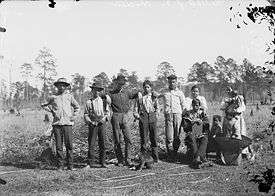National Anthropological Archives
| Part of a series on the |
| Anthropology of art, media, music, dance and film |
|---|
|
Basic concepts |
| Social and cultural anthropology |


The National Anthropological Archives is a collection of historical and contemporary documents maintained by the Smithsonian Institution, which document the history of anthropology and the world's peoples and cultures. It is located in the Smithsonian's Museum Support Center in Suitland, Maryland and is part of the Department of Anthropology at the National Museum of Natural History.
History
The National Anthropological Archives (NAA) is the successor to the archives of the Bureau of American Ethnology (BAE), which was founded in 1879 by John Wesley Powell.[1] In 1968, The NAA was established, incorporating the collections of the BAE, which focused on American Indians, as well as the papers of curators in the National Museum of Natural History's Department of Anthropology, who conducted research around the world.[1][2] The establishment of the NAA was supported by grants from the Wenner-Gren Foundation with the aim of providing a repository of record for personal research materials created by scholars without a home institution (or whose home institution had no archives), in order to promote the preservation of the anthropological record.
Collections
The NAA is the only archival repository in the United States dedicated exclusively to preserving ethnographic, archaeological, and linguistic fieldnotes, physical anthropological data, photographs, sound recordings and other media created by American anthropologists.[3] The collection includes documents such as fieldnotes, journals, manuscripts, correspondence, photographs, maps, sound recordings, all compiled by prominent researchers from the Smithsonian or other research institutions. Spanning over 150 years of American history and world history, materials held in the archives include nearly 635,000 photographs, 20,000 works of indigenous art, and 11,400 sound recordings.[4]
In 2010, the NAA received a Save America's Treasures grant to preserve manuscripts relating to endangered languages. These manuscripts include vocabularies, narratives, and other texts representing approximately 250 American Indian languages.[5] Many photographs and manuscript pages from the NAA collections, including 8,200 pages of Cherokee language materials, have been scanned and are available online for research through SIRIS, the Smithsonian’s online catalog.[5] In 2014, the NAA received a grant for preservation and digitization of sound recordings of endangered languages.[6]
See also
References
- 1 2 Ruwell, Mary Elizabeth (1995). Silverman, Sydel and Nancy J. Parezo, ed. Preserving the Anthropological Record: The National Anthropological Archives (PDF). Wenner-Gren Foundation for Anthropological Research, Inc. Retrieved 27 November 2012.
- ↑ "History of the National Anthropological Archives". National Anthropological Archives, Smithsonian Institution. Retrieved 27 November 2012.
- ↑ "National Anthropological Archives". Guide to Archival Resources at the Smithsonian. Smithsonian Institution. Retrieved 9 July 2012.
- ↑ "About the Archives". National Anthropological Archives, Smithsonian Institution. Retrieved 27 November 2012.
- 1 2 "National Anthropological Archives Receives Grant from President's Committee on the Arts and Humanities". Press Release. Smithsonian Institution. 20 July 2010. Retrieved 27 November 2012.
- ↑ "Smithsonian gets $1M to save endangered languages". Seattle PI. 2013-12-04. Retrieved 2013-12-10.
External links
| Wikimedia Commons has media related to National Anthropological Archives, United States. |
- National Anthropological Archives and Human Studies Film Archives homepage
- SIRIS, Smithsonian online catalog
- Department of Anthropology, National Museum of Natural History, Smithsonian Institution